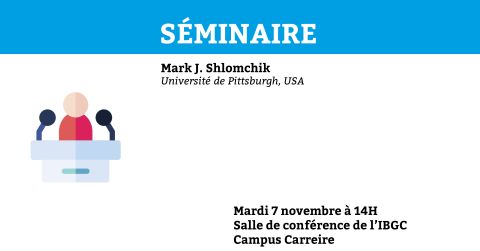Mark Shlomchik est un expert a la renomme internationale dans les domaines du lymphocyte B et de l'auto-immunité.
Autoimmunity research: We are using genetically modified mouse models to address the roles of specific cell types (e.g. B cells, T cells and DCs) in systemic autoimmunity. Currently we are particularly interested in the identity and function of autoreactive T cells that help autoreactive B cells and that infiltrate target tissues using novel TCR cloning methods. A second major area is investigating the regulatory role of TLR9 and stimulatory role of TLR7 in lupus, and to define how TLRs function in tissue-specific fashion. To this end we have made conditional alleles of both TLR7 and TLR9 on a lupus-prone mouse genetic background and we are dissecting the tissue-specific roles of these receptors. We have also introduced key point mutants and chimeric molecules into the germline of this mouse strain to test hypothesis about function in vivo and in signaling assays in vitro. Finally, we continue to work on the role of B cells in lupus and how best to therapeutically target them.
B cell immunity: we are investigating the mechanisms of cellular selection and differentiation in the germinal center (GC), a site of rapid proliferation, mutation, and differentiation into memory B cells (MBC). We recently showed that the GC shifts its output from MBC to plasma cells as it matures with time. We are actively working on “non-canonical” extrafollicular B cell responses, which induce isotype switch and mutation outside of GC as well as generate MBC; a key question is what controls the choice between these two types of response. We have also identified novel subsets of MBC in mice and are studying their origins and function using epigenetic, single cell, and subpopulation gene expression analysis. Our work on MBC has now been extended to humans, where, by studying multiple lymphoid and mucosal tissues, we have identified novel populations of MBC.
Training and mentoring: Dr. Shlomchik is the PI of a T32 on Autoimmunity and Immunopathology. He has trained over 41 students and fellows, most of whom remain in science and several of whom have independent faculty positions. His position as a physician-scientist conducting disease-related basic research has enabled him to provide a combination of scientific and career advice and mentoring that have in turn made his lab an attractive destination for trainees with similar interests and background.
Selected Publications
1. Weisel, F.J., G.V. Zuccarino-Catania, M. Chikina, and M.J. Shlomchik. 2016. A Temporal Switch in the Germinal Center Determines Differential Output of Memory B and Plasma Cells. Immunity. 44:116-30.
http://www.ncbi.nlm.nih.gov/pubmed/26795247
2. Giles, J.R., A.T. Neves, A. Marshak-Rothstein, and M.J. Shlomchik. 2017. Autoreactive helper T cells alleviate the need for intrinsic TLR signaling in autoreactive B cell activation. JCI Insight. 2:e90870.
https://www.ncbi.nlm.nih.gov/pubmed/28239656
3. Luo, W., F. Weisel, and M.J. Shlomchik. 2018. B Cell Receptor and CD40 Signaling Are Rewired for Synergistic Induction of the c-Myc Transcription Factor in Germinal Center B Cells. Immunity. 48:313-26 e5.
https://www.ncbi.nlm.nih.gov/pubmed/29396161
4. Tilstra, J.S., L. Avery, A.V. Menk, R.A. Gordon, S. Smita, L.P. Kane, M. Chikina, G.M. Delgoffe, and M.J. Shlomchik. 2018. Kidney-infiltrating T cells in murine lupus nephritis are metabolically and functionally exhausted. J Clin Invest. 128:4884-97.
https://www.ncbi.nlm.nih.gov/pubmed/30130253

Séminaire du Pr Mark J. Shlomchik
Mark J. Shlomchik, Université de Pittsburgh, USA est invité par Claire Leibler (ImmunoConcept) pour un séminaire le 7 novembre à 14h en salle de conférence de l'IBGC. Le séminaire sera suivi d'une table-ronde réservée aux jeunes chercheurs.
Salle de conférence de l'IBGC, Campus Carreire,

